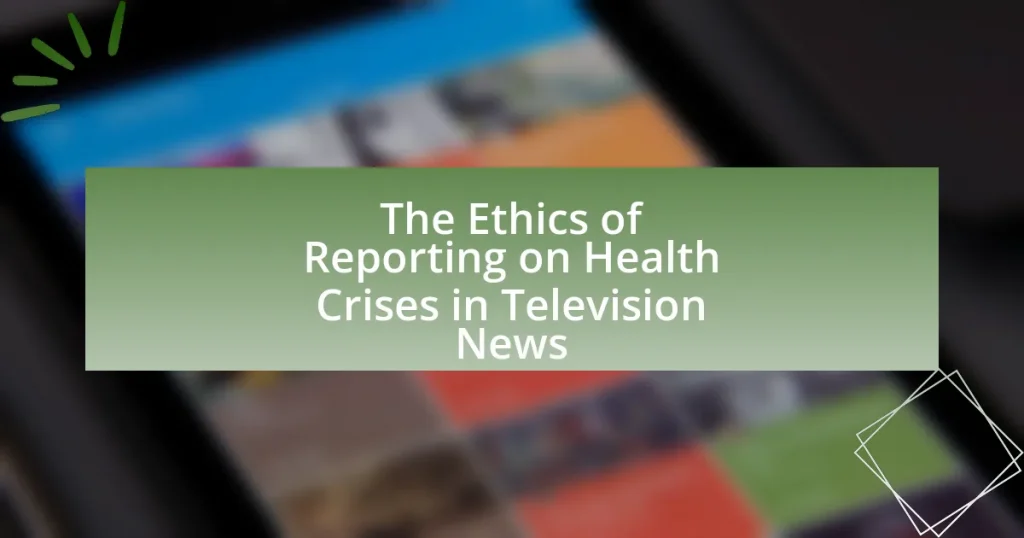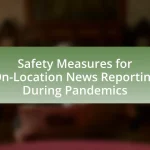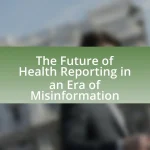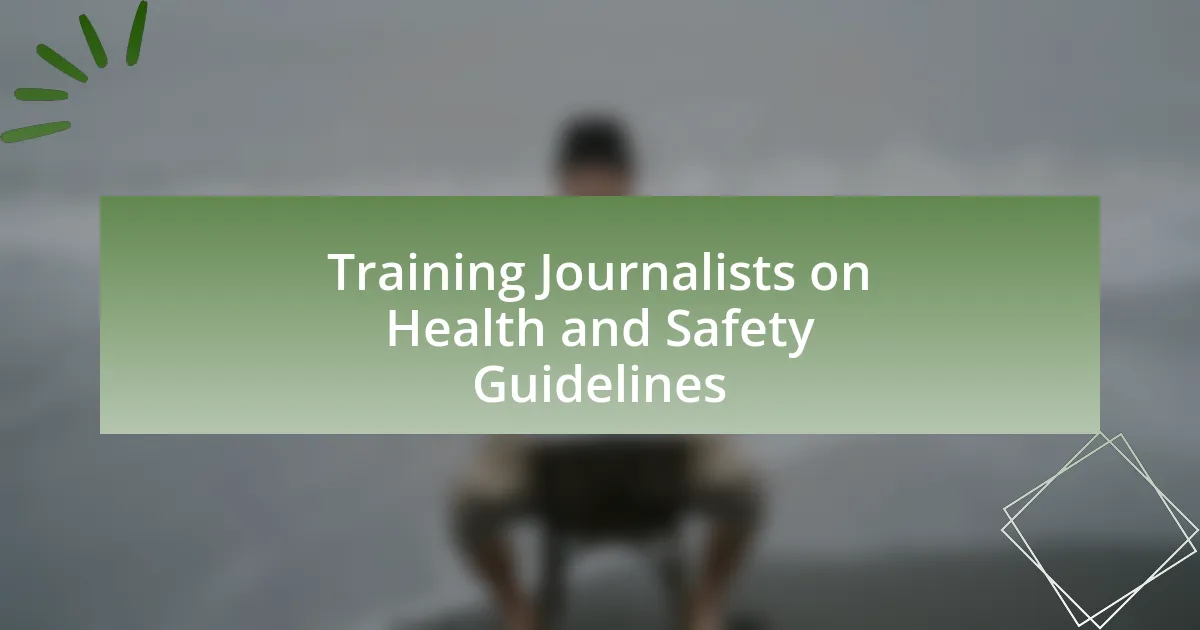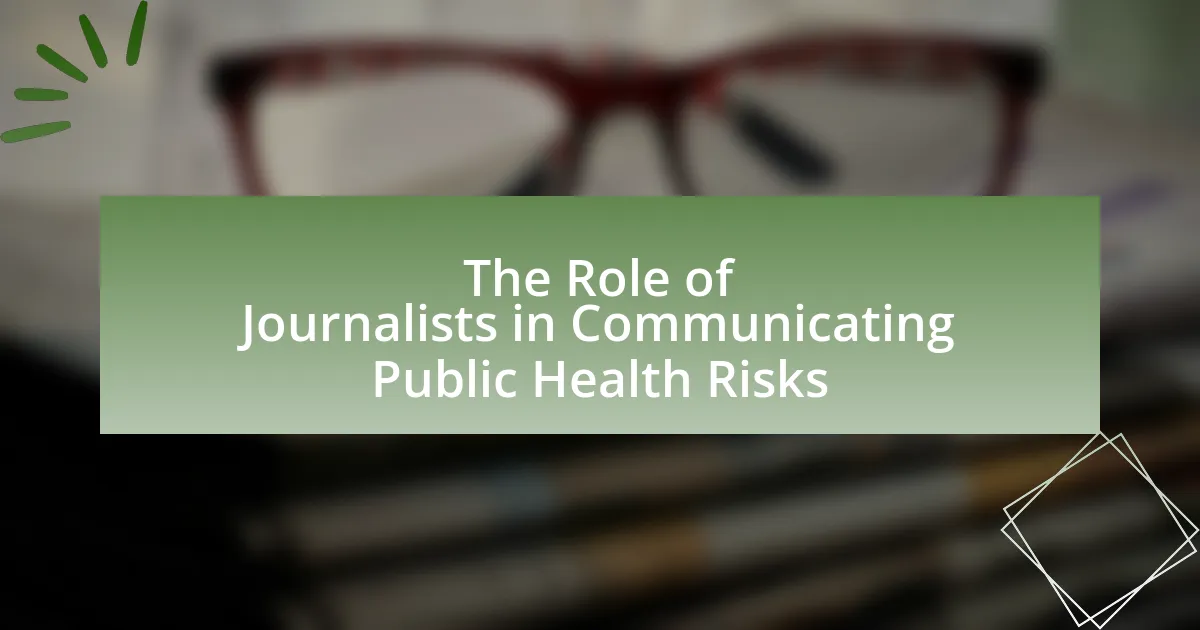The article examines the ethical considerations involved in reporting on health crises in television news, emphasizing the importance of accuracy, sensitivity, and the potential for public panic. It discusses how journalists balance the need for timely information with the necessity of fact-checking and responsible reporting, particularly during events like the COVID-19 pandemic. The piece highlights the role of fact-checking in maintaining credibility, the impact of sensationalism on public perception, and the ethical guidelines established by organizations such as the Society of Professional Journalists. Additionally, it addresses the challenges journalists face, including misinformation, conflicts of interest, and the ethical dilemmas surrounding sensitive health data.
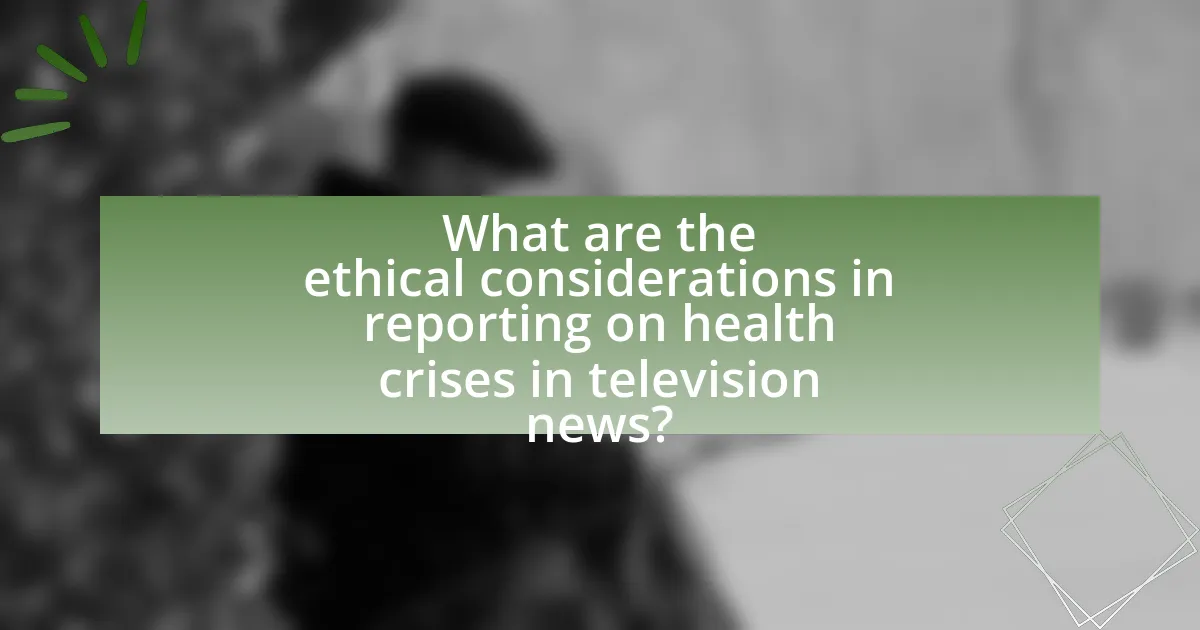
What are the ethical considerations in reporting on health crises in television news?
Ethical considerations in reporting on health crises in television news include accuracy, sensitivity, and the potential for public panic. Journalists must ensure that information is factually correct and sourced from credible experts to avoid misinformation, which can exacerbate public fear and confusion. Sensitivity is crucial, as reporting on health crises often involves vulnerable populations; therefore, respecting privacy and avoiding sensationalism is essential. Additionally, the potential for public panic necessitates responsible reporting that balances the urgency of the situation with the need for calm and rational communication. These ethical principles are supported by guidelines from organizations such as the Society of Professional Journalists, which emphasize the importance of minimizing harm and acting in the public interest.
How do journalists balance accuracy and urgency in health crisis reporting?
Journalists balance accuracy and urgency in health crisis reporting by implementing rigorous fact-checking processes while prioritizing timely dissemination of information. They often rely on verified sources, such as public health officials and scientific studies, to ensure the information presented is credible. For instance, during the COVID-19 pandemic, journalists utilized real-time data from the World Health Organization and the Centers for Disease Control and Prevention to provide accurate updates while addressing the urgent need for public awareness. This dual approach helps maintain public trust and ensures that critical information is communicated effectively without compromising factual integrity.
What role does fact-checking play in ensuring accurate health crisis coverage?
Fact-checking plays a crucial role in ensuring accurate health crisis coverage by verifying information before it is disseminated to the public. This process helps prevent the spread of misinformation, which can lead to public panic and misinformed health decisions. For instance, during the COVID-19 pandemic, fact-checking organizations identified and corrected numerous false claims about the virus, its transmission, and treatment options, thereby promoting informed public responses and adherence to health guidelines. By maintaining accuracy in reporting, fact-checking enhances the credibility of news outlets and fosters trust among viewers, which is essential during health emergencies.
How can the urgency of reporting affect the quality of information presented?
The urgency of reporting can significantly compromise the quality of information presented. When news organizations prioritize speed over accuracy, they may disseminate incomplete or misleading information, which can lead to public panic or misinformation. For instance, during the COVID-19 pandemic, many outlets rushed to report on emerging data without thorough verification, resulting in the spread of unsubstantiated claims about transmission rates and treatment efficacy. This urgency often stems from competitive pressures in the media landscape, where being first to report can overshadow the necessity for fact-checking and contextual analysis.
Why is sensitivity important in health crisis reporting?
Sensitivity is crucial in health crisis reporting because it ensures that the information conveyed respects the dignity and emotional state of affected individuals and communities. By prioritizing sensitivity, reporters can avoid causing additional distress or panic, which is particularly important during vulnerable times. For instance, studies have shown that insensitive reporting can lead to misinformation and exacerbate public fear, as seen during the Ebola outbreak in 2014, where sensationalized coverage contributed to stigma against affected individuals. Therefore, sensitivity in reporting not only fosters trust between the media and the public but also promotes responsible communication that can aid in effective public health responses.
How can reporting on health crises impact public perception and behavior?
Reporting on health crises significantly shapes public perception and behavior by influencing awareness, understanding, and response to health threats. For instance, during the COVID-19 pandemic, extensive media coverage heightened public awareness of the virus’s risks, leading to increased compliance with health guidelines such as mask-wearing and social distancing. Research published in the journal Health Communication found that individuals exposed to frequent news updates about COVID-19 were more likely to adopt preventive behaviors, demonstrating the direct correlation between media reporting and public action. Thus, effective reporting can mobilize communities to respond proactively to health crises, while misinformation or sensationalism can lead to panic or complacency.
What are the potential consequences of sensationalism in health crisis news?
Sensationalism in health crisis news can lead to widespread misinformation and public panic. When media outlets exaggerate or dramatize health issues, they can distort the public’s understanding of the severity and nature of the crisis. This distortion can result in individuals making poor health decisions, such as avoiding necessary medical care or engaging in harmful behaviors based on fear rather than facts. For instance, during the Ebola outbreak in 2014, sensationalist reporting contributed to heightened anxiety and stigma surrounding affected individuals, which hindered public health efforts. Furthermore, sensationalism can undermine trust in health authorities and the media itself, leading to skepticism about legitimate health information.
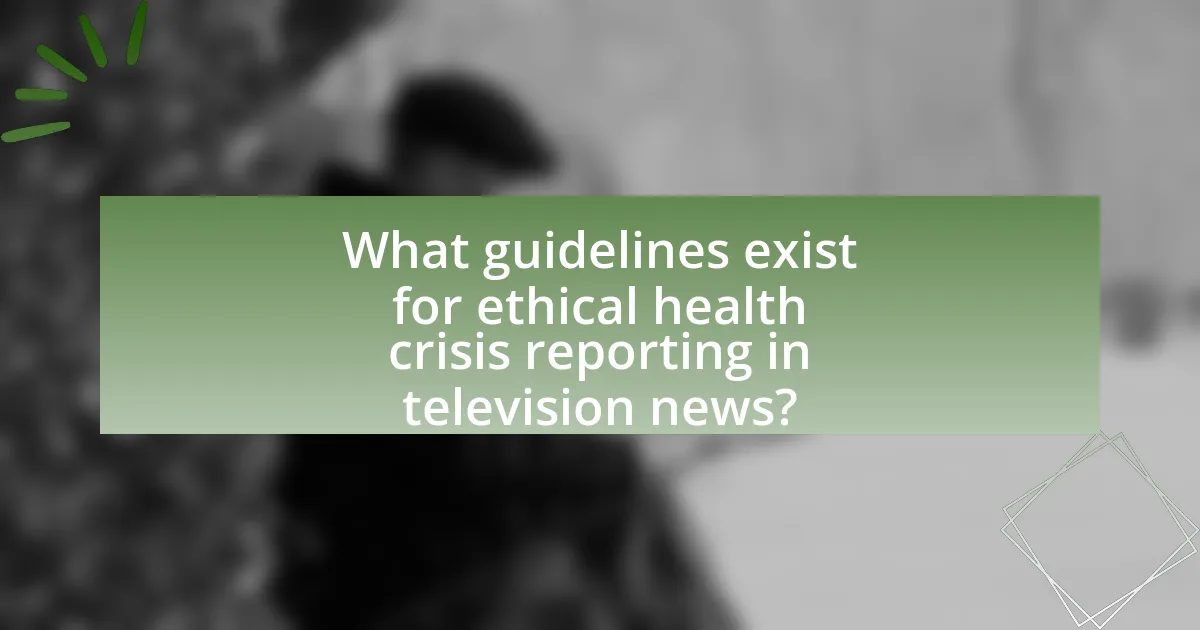
What guidelines exist for ethical health crisis reporting in television news?
Ethical health crisis reporting in television news is guided by principles that prioritize accuracy, sensitivity, and public welfare. Journalists are expected to verify information from credible sources before broadcasting, ensuring that the public receives reliable updates during health emergencies. Additionally, reporters should avoid sensationalism and fear-mongering, as these practices can lead to public panic and misinformation.
Furthermore, respecting the privacy and dignity of individuals affected by health crises is crucial; this includes obtaining consent before sharing personal stories or images. The Society of Professional Journalists emphasizes the importance of minimizing harm while providing context to help audiences understand the implications of the health crisis. These guidelines are essential for maintaining trust and credibility in journalism, particularly during critical times when accurate information is vital for public health and safety.
How do media organizations establish ethical standards for reporting?
Media organizations establish ethical standards for reporting through a combination of internal guidelines, industry codes, and adherence to legal frameworks. These standards are often developed by editorial boards and ethics committees that assess the implications of reporting practices on public trust and societal impact. For instance, the Society of Professional Journalists (SPJ) provides a widely recognized code of ethics that emphasizes principles such as accuracy, fairness, and accountability, which many media organizations adopt as foundational elements of their reporting standards. Additionally, ongoing training and workshops help journalists understand and navigate ethical dilemmas, particularly in sensitive areas like health crises, ensuring that reporting is responsible and informed by best practices.
What are the key components of ethical guidelines for health reporting?
The key components of ethical guidelines for health reporting include accuracy, transparency, sensitivity, and accountability. Accuracy ensures that information presented is factually correct and based on credible sources, which is crucial in maintaining public trust. Transparency involves disclosing the sources of information and potential conflicts of interest, allowing audiences to assess the reliability of the reporting. Sensitivity requires journalists to consider the emotional impact of health issues on individuals and communities, promoting respectful and compassionate coverage. Accountability mandates that journalists take responsibility for their reporting, correcting errors promptly and addressing any harm caused by misinformation. These components collectively uphold the integrity of health reporting, as emphasized by organizations like the World Health Organization and the American Medical Association, which advocate for responsible communication in health crises.
How do these guidelines address the needs of vulnerable populations?
These guidelines address the needs of vulnerable populations by emphasizing ethical reporting practices that prioritize sensitivity and accuracy. They advocate for the inclusion of diverse voices and perspectives, ensuring that marginalized groups are represented fairly in health crisis narratives. For instance, the guidelines recommend avoiding stigmatization and sensationalism, which can exacerbate the challenges faced by these populations. By promoting informed consent and respecting privacy, the guidelines help protect vulnerable individuals from potential harm associated with media exposure during health crises.
What role do regulatory bodies play in health crisis reporting ethics?
Regulatory bodies play a crucial role in establishing and enforcing ethical standards for health crisis reporting. These organizations, such as the Federal Communications Commission (FCC) in the United States, set guidelines that ensure accuracy, fairness, and accountability in media coverage during health emergencies. For instance, they mandate that broadcasters provide factual information and avoid sensationalism, which can lead to public panic or misinformation. By implementing these regulations, they help maintain public trust and ensure that the information disseminated is reliable and serves the public interest.
How do regulations differ across countries regarding health crisis news?
Regulations regarding health crisis news differ significantly across countries, primarily influenced by legal frameworks, cultural norms, and government policies. For instance, in the United States, the First Amendment protects freedom of speech, allowing media to report extensively on health crises, while the Health Insurance Portability and Accountability Act (HIPAA) restricts the sharing of personal health information. In contrast, countries like Germany have stricter regulations that prioritize public health and safety, requiring media to verify information before dissemination to prevent misinformation. Additionally, in China, the government exercises tight control over news reporting, often censoring information related to health crises to maintain social stability. These differences illustrate how national priorities and legal structures shape the reporting landscape during health emergencies.
What impact do these regulations have on journalistic practices?
Regulations significantly shape journalistic practices by enforcing standards that prioritize accuracy, accountability, and ethical reporting. These regulations compel journalists to verify information rigorously before dissemination, thereby reducing the spread of misinformation during health crises. For instance, the Federal Communications Commission (FCC) mandates that broadcasters provide accurate information to protect public health, which directly influences how news organizations report on health-related issues. This regulatory framework ensures that journalists adhere to ethical guidelines, fostering trust with the audience and enhancing the credibility of news outlets.
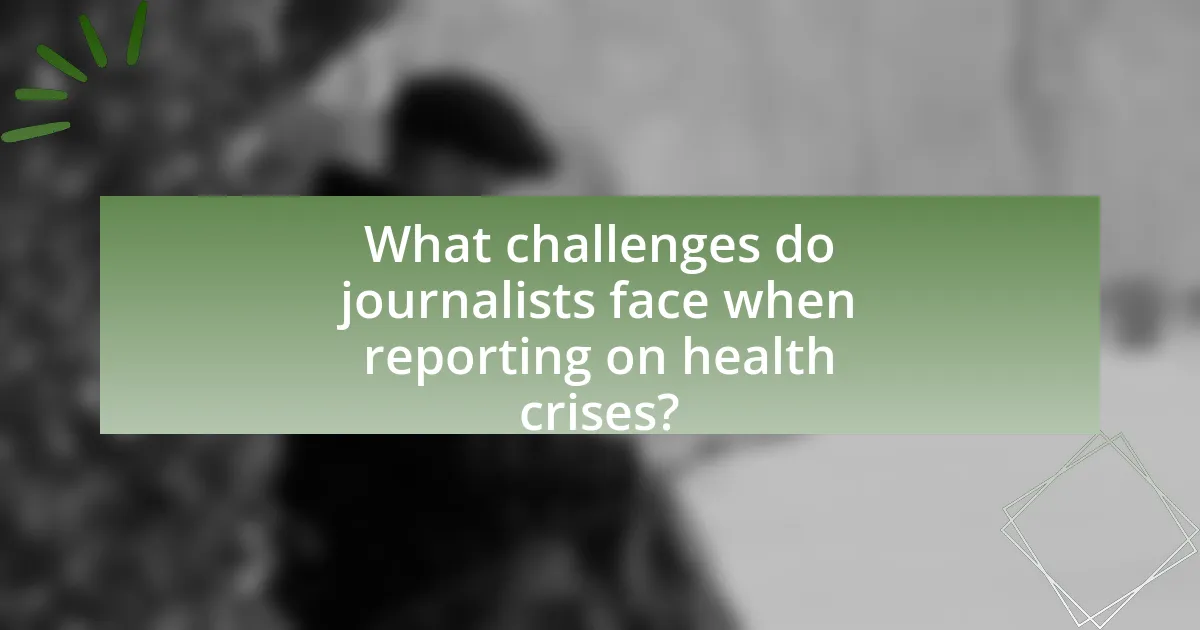
What challenges do journalists face when reporting on health crises?
Journalists face significant challenges when reporting on health crises, including the need for accurate information, the pressure of rapid news cycles, and ethical considerations regarding public health messaging. Accurate information is crucial, as misinformation can lead to public panic or complacency; for instance, during the COVID-19 pandemic, the World Health Organization emphasized the importance of reliable sources to combat misinformation. Rapid news cycles often force journalists to report quickly, which can compromise the thoroughness of their research and fact-checking. Additionally, ethical considerations arise when balancing the urgency of reporting with the potential for stigmatization of affected populations, as seen in the coverage of Ebola outbreaks, where sensationalism could lead to discrimination against survivors. These challenges necessitate a careful approach to ensure responsible journalism in health crisis reporting.
How do misinformation and disinformation affect health crisis reporting?
Misinformation and disinformation significantly undermine health crisis reporting by distorting public perception and eroding trust in credible sources. During health crises, such as the COVID-19 pandemic, false information can lead to panic, non-compliance with health guidelines, and poor health outcomes. For instance, a study published in the journal “Health Affairs” found that misinformation about COVID-19 treatments led to increased hospitalizations due to individuals seeking unproven remedies instead of following scientifically backed medical advice. This illustrates how the spread of inaccurate information can directly impact public health and safety, highlighting the critical need for accurate reporting in health crises.
What strategies can journalists use to combat misinformation?
Journalists can combat misinformation by implementing fact-checking protocols, utilizing credible sources, and promoting media literacy among audiences. Fact-checking protocols involve verifying information before publication, which helps ensure accuracy and builds trust. Utilizing credible sources, such as experts and peer-reviewed studies, provides a solid foundation for reporting, reducing the likelihood of spreading false information. Promoting media literacy empowers audiences to critically evaluate information, fostering a more informed public that can discern credible news from misinformation. These strategies are essential in maintaining journalistic integrity, especially during health crises where misinformation can have serious consequences.
How does social media influence the spread of health-related misinformation?
Social media significantly influences the spread of health-related misinformation by facilitating rapid information dissemination and enabling user-generated content. Platforms like Facebook and Twitter allow users to share unverified health claims widely, often without fact-checking, leading to the viral spread of false information. A study published in the American Journal of Public Health found that misinformation about vaccines spread faster than accurate information on social media, highlighting the platform’s role in amplifying misleading narratives. Additionally, algorithms prioritize engagement over accuracy, further promoting sensationalized health content, which can mislead the public and undermine trust in legitimate health information sources.
What are the ethical dilemmas faced by journalists during health crises?
Journalists face several ethical dilemmas during health crises, primarily concerning accuracy, sensationalism, and the potential for harm. The need for timely reporting can conflict with the obligation to provide verified information, leading to the risk of spreading misinformation. For instance, during the COVID-19 pandemic, some media outlets faced criticism for sensationalizing statistics or unverified claims, which could incite public panic. Additionally, journalists must navigate the ethical implications of privacy and consent when reporting on affected individuals, balancing the public’s right to know with the dignity of those impacted. The Society of Professional Journalists emphasizes the importance of minimizing harm, which becomes particularly challenging in high-stakes health situations where emotions run high and misinformation can have serious consequences.
How can journalists navigate conflicts of interest in health reporting?
Journalists can navigate conflicts of interest in health reporting by adhering to strict ethical guidelines and transparency practices. They should disclose any potential conflicts, such as financial ties to health organizations or personal relationships with sources, to maintain credibility. For instance, the Society of Professional Journalists emphasizes the importance of transparency in reporting, which helps audiences understand the context of the information presented. Additionally, journalists can seek independent verification of health claims and rely on peer-reviewed studies to ensure accuracy and objectivity in their reporting. This approach not only mitigates bias but also reinforces the integrity of health journalism.
What ethical challenges arise when reporting on sensitive health data?
Reporting on sensitive health data presents several ethical challenges, primarily concerning privacy, consent, and potential harm to individuals. Journalists must navigate the obligation to inform the public while respecting the confidentiality of patients’ medical information. For instance, disclosing identifiable health data without consent can lead to stigmatization or discrimination against individuals, violating ethical standards set by organizations like the American Medical Association. Additionally, the risk of misinformation can exacerbate public fear or misunderstanding, particularly during health crises, as seen in the reporting of the Ebola outbreak, where sensationalized coverage led to increased stigma against affected communities. Thus, ethical reporting requires a careful balance between transparency and the protection of individual rights.
What best practices can journalists adopt for ethical health crisis reporting?
Journalists can adopt several best practices for ethical health crisis reporting, including prioritizing accuracy, providing context, and ensuring sensitivity towards affected individuals. Accuracy is crucial; journalists should verify information from reliable sources, such as health organizations and experts, to prevent the spread of misinformation. Providing context helps audiences understand the broader implications of the health crisis, including statistics and historical comparisons, which can clarify the situation’s severity. Sensitivity is essential when reporting on individuals affected by the crisis; journalists should avoid sensationalism and respect privacy, particularly when discussing personal stories. These practices align with ethical journalism standards, which emphasize truthfulness, fairness, and accountability in reporting.
How can journalists ensure they are providing balanced and fair coverage?
Journalists can ensure they are providing balanced and fair coverage by actively seeking diverse perspectives and verifying information from multiple sources. This approach helps to mitigate bias and presents a more comprehensive view of the issue at hand. For instance, during health crises, journalists should include voices from various stakeholders, such as healthcare professionals, affected individuals, and public health officials, to capture a range of experiences and opinions. Research indicates that balanced reporting not only enhances credibility but also fosters public trust; a study by the Pew Research Center found that audiences are more likely to trust news outlets that present multiple viewpoints.
What resources are available for journalists to improve their ethical reporting skills?
Journalists can improve their ethical reporting skills through various resources, including training programs, guidelines, and professional organizations. The Society of Professional Journalists (SPJ) offers a Code of Ethics that serves as a foundational guideline for ethical journalism. Additionally, the Poynter Institute provides workshops and online courses focused on ethical reporting practices. The International Federation of Journalists (IFJ) also publishes resources and guidelines that emphasize ethical standards in journalism. These organizations and their materials are widely recognized in the industry, ensuring that journalists have access to credible and effective tools for enhancing their ethical reporting skills.
